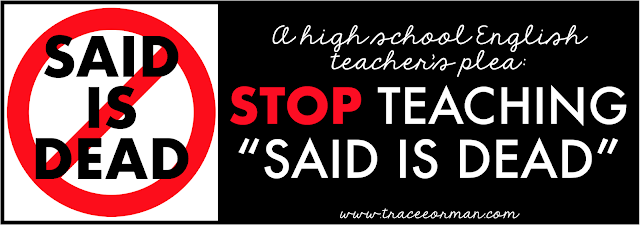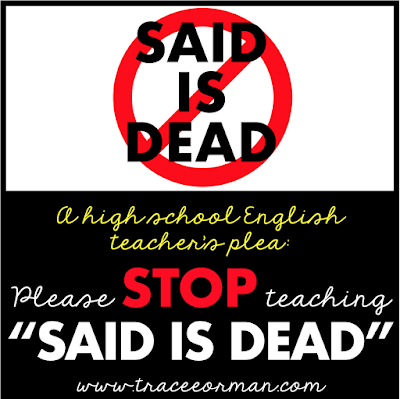You've probably seen the pictures on Pinterest proclaiming that "Said is Dead!" with columns of alternative attributions to use for more descriptive writing. I've never understood this. "Said" serves a useful purpose in writing and quoting dialogue.
I wondered why students were being taught not to use it? This certainly was not anything I had learned in any of my writing courses.
I was informed that students are encouraged to use alternatives to make their writing more descriptive. "Show, don't tell!" Hmmm... I encourage my students to "show, don't tell" as well, but I've never focused on the attribution.
Should I? Does it really enhance your writing by using alternative synonyms?
I don't think it does. In fact, I think it can make your writing worse.
I know this may upset many teachers out there who insist that getting rid of "said" makes for better writing, so here are my reasons why you should keep "said" alive:
1. Expository/Informative writing must be unbiased, therefore using anything but "said" would be creating a connotation or bias. This is my #1 problem with "said is dead." Many of my journalism students will want to use other words beside "said" (or "says") in their articles. This is a big no-no in journalism.
Look at the front page of a newspaper and read any of the latest news stories. For every quote the writer will use "said" or "says." (See example, below.) It would be unethical for the writer of a news story to create bias by using words like "demanded," "argued," "gloated," or "whined." If you do see these words in a "news" story, I wouldn't trust the writer or the publication. This is a technique that pundits will use to twist or distort a quote to promote their own opinion. It's also the quickest way to see if a news source is reliable and unbiased: if their writers or newscasters use attributions other than "said," then they are, indeed, biased. It is wrong for someone claiming to be a journalist--whether in print or broadcast--to use biased terminology when reporting the news.
2. "Said," like any other word, shouldn't be overused; but that doesn't mean it should be replaced. If you find yourself overusing the word "said," instead of replacing it with other words, see if it is even needed at all. For example, author Suzanne Collins demonstrates in The Hunger Games the technique (or rule?) of starting a new paragraph with each new speaker. While in some cases it may be necessary to attribute the quote to a certain speaker, in many cases an attribution can be left off:
 |
| An example when attribution is not necessary in lines of dialogue. |
3. If your line of dialogue needs improving, changing the attribution isn't the answer. Your quotes should speak for themselves. Getting creative with synonyms for said will not make the dialogue better. In fact, it will probably distract the reader. Try improving the actual dialogue, not the attribution:
4. There's a reason why "said" works in writing: we tend to skip over the word when we're reading it. And that's OK! That is what makes the piece flow. If we begin to muck-up our writing with alternatives to "said," it disrupts that natural flow.
It IS OK to use alternatives to "said" with younger students.
Many children's books will use creative attributions in dialogue, and that's fine. The audience for those works are children who have very short attention spans and crave dramatic effects; using "exclaimed" and "growled" and "whimpered" will work perfectly for that audience. But unless you are having your students only write for their peers aged 2-8, please do their future English teachers a favor and keep "said" alive. Thank you.








